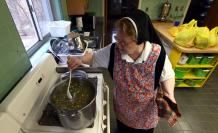In November 2019, when Paamari was chosen as the restaurant where world-ranking tennis player Roger Federer would dine During his visit to Quito, Jesús Rojas, executive chef, served his most elaborate dishes for the occasion.
Oysters with citrus foam and lemon false caviar, tuna crusted with black and white sesame, a rack of Riobamba lamb ribs, macerated with Andean herbs, a chicha morada sorbet and an organic cocoa crumble consisted of this menu, for which diners they paid a $ 1,500 holder.
Nuema, ancestral flavors for modern diners
–
Read more
–
In that year, Quito had been named as the capital of the gastronomic innovation of the country, and each time new proposals were added to the city, by the hand of young chefs, who came to elevate the native ingredients.
But the pandemic brought a brake on innovation and also on the sustainability of signature cuisine.
One by one they closed their doors: Paamari, Quinqué and recently, Anker, which last year was recognized in the list ‘The Spirit of Latin America’, of the prestigious ranking The World´s 50 Best Restaurants (best restaurants in the world).
On average, although there are no official figures for this category, it is estimated that 21% of the capital’s high-end restaurants have gone bankrupt.
Those who stay open recognize that adapting to the ‘new reality’ is a challenge that offers no guarantees.
In El Salnés, located on Isla Isabela and Río Coca, Mauricio Acuña starts the morning at 07:00 to ensure that time will reach you.
It is the fourth in a long family line of chefs. He returned to the country in 2011After years of working in European kitchens, and in doing so he found curious local ingredients that he wanted to exploit.
“El Salnés emerged as a tribute to products such as Iberian black pig from Imbabura, that had almost disappeared, and fine aroma chocolate, worked through a proposal anchored in sustainability “, he commented.
Along with the establishment, the space has catering and a deli that opened during the pandemic, and that offers cold cuts and preserves prepared on site at home.
As of December, Acuña explains, activity at the restaurant seemed to recover, but the new restrictions have put a stop to the flow of visitors. “The restaurants that haven’t gone bankrupt so far probably won’t be able to hold out. It is very painful, because we were on the cusp of an important movement in Quito, we were finally on the gastronomic map of Latin America, with respect to innovation, and now we don’t even know if we can continue ”, he said.
With him agrees Érick Dryer, founder of Ciré y Ciré Capital, in Cumbayá and Quito.
For the gastronomic project, which was founded eight years ago, the closure was synonymous with a large investment.
“Two weeks before the fortieth, we opened Ciré Capital and from one moment to another we could not continue. As the months passed, we decided buy a branded bus for delivery and we implement packages and boxes. When we finally reopened and we had already recovered customers, there was an explosion in a nearby restaurant that left us closed for a month and a half. Despite this, the delivery took effect and guaranteed that we can continue ”.

A book rescues the recipes of the cloister monasteries of the country
–
Read more
–
For Dryer, giving up is not an option, and points out that despite the lack of guarantees, he will continue to find methods to continue cooking.
“This weekend closure and the eight o’clock curfews have been extremely tough for our entire industry. We can continue until May, but if it extends, things will get complicated. Even so, we are convinced that people value our proposal and believe in us. I am not throwing in the towel ”.
An evil that affects even ‘the Michelin’
The gastronomic temples worldwide have not been saved from bankruptcy either. In the most recent count, carried out at the beginning of April by the French portal ‘Gastrique’, more than 10,000 high-end establishments have closed their doors on three continents, including the famous winners of the Michelin stars, the highest international award.
According to the portal, they have joined the list of acclaimed establishments like ‘108’ in Copenhagen, The Greenhouse in London, Rech by Alain Ducasse, in Hong Kong, Don Alfonso 1890 in Toronto, and Blackbird in Chicago. The latter, led by chef Paul Kahan, had been considered one of the most innovative establishments in the US.
“The future is uncertain for haute cuisine, without safe steps or stable proposals until the pandemic stops raging. Some chefs have said they will return, it only remains to wait”, Indicated the portal.
– .

